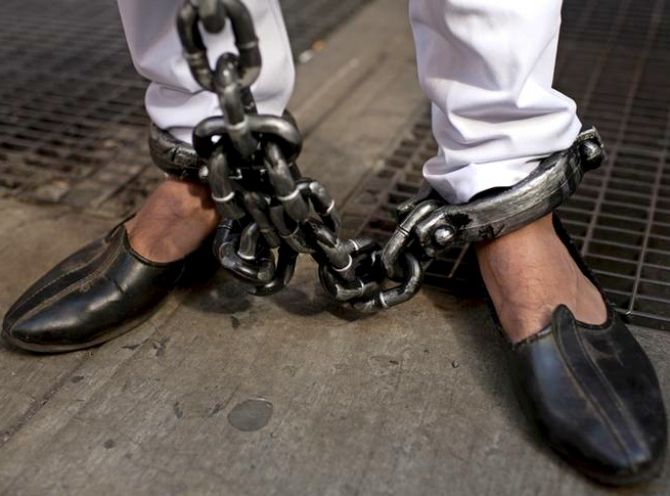'The nine judges with all their convictions, wisdom, intellectual girth and enlightened debate have not just stood up to the government, but disempowered the State in favour of the people,' says Maheshwar Peri.

Representational Photograph: Darren Ornitz/Reuters
In the recent past, successive governments have sought to turn the tables against the people and in favour of the State.
While the people were supposed to empower the governments, it is now the governments empowering people.
The Supreme Court's judgment stating that the Right to Privacy is a fundamental right re-establishes the norm that the individual is the raison d'etre of the State.
It is against this backdrop that the Supreme Court's judgment makes each of the nine judges my Heroes.
The fact that it was a nine-member bench and the judgment a unanimous one, reaffirms my faith in our Constitution.
The 370-page judgment effectively demolished many arguments laid out by the State towards greater authoritativeness that sought to usurp the powers of the people.
While democracy (thus the State) is by the people, for the people and of the people, recent actions have proved to be the opposite. This judgment demolishes the argument that people exist to serve the State.
Discussing the reason why Right to Privacy is a Fundamental Right and not a statutory right, Justice Rohinton Fali Nariman said, 'Statutory law can be made and also unmade by a simple Parliamentary majority. In short, the ruling party can, at will, do away with any or all of the protections contained in the statutes mentioned hereinabove.'
'Fundamental Rights, on the other hand, are contained in the Constitution so that there would be rights that the citizens of this country may enjoy despite the governments that they may elect... The recognition of such right in the Fundamental Rights chapter of the Constitution is only a recognition that such right exists notwithstanding the shifting sands of majority governments.'
Justice Abhay Manohar Sapre said, 'In my considered opinion, Right to Privacy of any individual is essentially a natural right, which inheres in every human being by birth. Such right remains with the human being till he/she breathes last. It is indeed inseparable and inalienable from a human being. In other words, it is born with the human being and extinguish with a human being.'
This supreme judgment also touched upon privacy, data privacy, homosexuality, abortion, eating habits and euthanasia, effectively taking a stand on many current debates in the country.
Justice Nariman said, 'As case law, both in the US and India show, this concept (of privacy) has travelled far from the mere right to be let alone to recognition of a large number of privacy interests...(including) rights as to... data protection'.
Justice K S Chelameswar said, 'A woman's freedom of choice whether to bear a child or abort her pregnancy are areas which fall in the realm of privacy.'
Justice Chelameswar also said, 'I do not think that anybody would like to be told by the State as to what they should eat.'
Justice Sanjay Kishan Kaul said, 'The privacy of the home must protect the family, marriage, procreation and sexual orientation, which are all important aspects of dignity. One's sexual orientation is undoubtedly an attribute of privacy.'
Justice D Y Chandrachud quoted from the Journal of Pennsylvania to classify privacy to make things crystal clear.
The fact that this judgment came in an environment where the State and governments around the world are becoming more powerful while the people are being disempowered, where judges and their judgments have made them vulnerable, has to be celebrated.
They were courageous, selfless and meticulous.
The nine judges with all their convictions, wisdom, intellectual girth and enlightened debate have not just stood up to the government but disempowered the State in favour of the people.
They empowered each of us, strengthened democracy, favoured humanity and challenged narrow jingoistic arguments.
And for me, this observation by the apex court sums it up the best: 'The refrain that the poor need no civil and political rights and are concerned only with economic well-being has been utilised through history to wreak the most egregious violations of human rights.'
Maheshwar Peri is the publisher of Careers360.
- Lawyer Apar Gupta: Why Privacy must be a Fundamental Right
- Lawyer Rahul Narayan: Why the privacy verdict matters










 © 2025
© 2025